It's amazing to me the people I meet in my travels who all seem to complain about the same thing.
The obligations in their lives that totally bring them down.
"Oh, we're going to see my uncle on Easter again this year. We always have such a miserable time but . . ."
"Oh, the moms at my kid's soccer practice drive me crazy and the coach is just so rude to my boy, but . . . "
"Oh, I signed up for another 3 year term on that community board that saps the time I'd rather spend with my friends, but . . ."
What is it with our love of self-abuse? And our inability to say no? And our falling prey to guilt trips?
I do it. You do it. We all do it.
We over commit to projects because "nobody else did" and couldn't be farther away from our true interests.
We get caught in the vicious cycle of doing the same things year after year (forgetting why we started doing that thing in the first place!)
We let people and experiences make us miserable.
But there's an alternative, you know. I bet you've tried it before. And, I bet you loved yourself when you did. It's what I call moving toward love or in the words of one of my favorite Howard Thurman quotes-
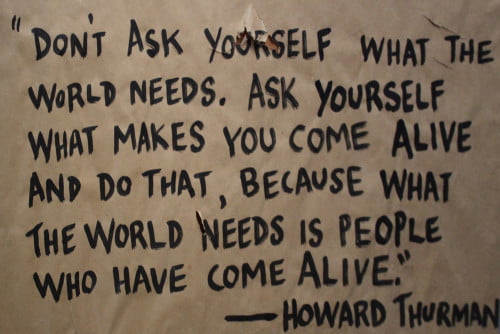
When we begin to let the priorities of our calendar reflect what we love and what makes us come alive, I believe our whole life begins to change.
Really.
Instead of filling our days with stuff that just checks stuff off the list or keeps the world spinning around (or so we think), we have the choice every day to move toward love-- doing what we enjoy the most and the people we enjoy the most doing it with!
Really.
 By this I don't mean we all go out and quit our day jobs tomorrow (the bills do have to be paid), but we begin by making small choices every week in the direction of what we love. Maybe for you it's a . . .
By this I don't mean we all go out and quit our day jobs tomorrow (the bills do have to be paid), but we begin by making small choices every week in the direction of what we love. Maybe for you it's a . . .
For moving toward love IS whatever brings us both joy and deeper connection to ourselves and/ or others.
Anne Lamott says it best: "I think joy and sweetness and affection are a spiritual path. We're here to know God, to love and serve God, and to be blown away by the beauty and miracle of nature. You just have to get rid of so much baggage to be light enough to dance, to sing, to play."
It take courage of course to live like this-- to come alive.
NO can be an earth shattering word to people around us, especially as we begin to say potentially for the first time.
It's hard to tell our children no.
It's hard to tell our parents no.
It's hard to tell our best friends no.
It's our life that we will one day be accountable before our Maker. So why would you and I want to waste our precious days on relationships, on projects, or on experiences that make us feel less than? Or drained? Or discouraged? Really why?
So if you're needing someone to give you permission this week to say yes to something you LOVE and no to something you hate, let me be your pastor today.
It's a great spiritual path.
Excerpts from a sermon preached at Broadneck Baptist Church, Annapolis, MD from Luke 2:41-52
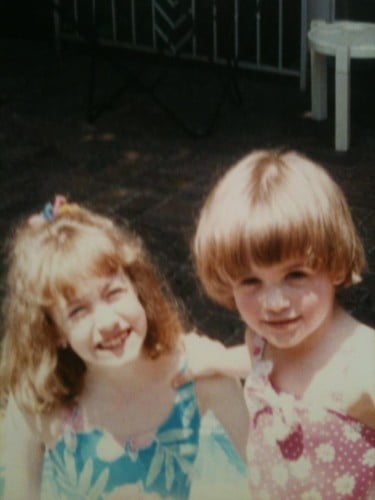
I don’t know if you’ve participated in the social media craze called, #TBT (Throw Back Thursday) when folks post pictures of themselves from years ago on Facebook, Instagram or Twitter.
Though some simply post pictures from last Christmas or a fun vacation a few years ago, my favorite #TBT are those that go back to childhood.
Over Christmas week, while Kevin and I were visiting with my extended family in Georgia—something happened that hadn’t happened in a long time. We had a whole 30 min of Kevin and Elizabeth Hagan #TBT on the TV.
For, my nephew, Landon got out our wedding video. And before our eyes flashed toddler and elementary school pictures of both Kevin and me while sappy music played in the background. Though there were points that both Kevin and I wanted to look away—I mean who really needs to see a picture of herself as a 6-month old self in a kitchen sink taking a bath?
I have to say the joy that it brought the younger kids in our family to watch it was palpable.
For to see “Uncle Kevin” and “Aunt Elizabeth” without clothes and smiling surrounded by bath was the very best thing in the world, it seemed. In their eyes, these photos made us more like them! I've included one of them-- me, aged 8 and my sister, aged 2 playing in a pool in my grandmother's backyard.
For these reasons and many more, I believe this is why we get a rare glimpse of boy Jesus in Luke’s narration of the gospel story.
Luke wants to show us a boy with parents named Mary and Joseph. Luke wants to show us a boy with a strong Jewish heritage. Luke wants to show us a boy who make a yearly pilgrimage to Jerusalem to celebrate the Passover.
We don’t learn anything about the event itself, only that when the festivities are over something huge is about to occur.
This is the main event: Jesus’ family and friends are on their way home to Nazareth—seemingly in a large group. Safety in numbers, right? For it would be a 3-4 day walking journey depending on how fast their caravan traveled. No small trip!
And for a day everything went swell. I can imagine the mood was light, full of the inspiration they’d just received from the biggest religious holiday of the year.
But, what came next was the ancient Galilee version of “Home Alone.” As it played out in Luke’s account, instead the boy Kevin being left at child in home or on the streets of New York City while the rest of his family went on vacation elsewhere, boy Jesus is in Jerusalem. He’s in Jerusalem alone.
It’s one of those “worst case scenerios” of parenting!
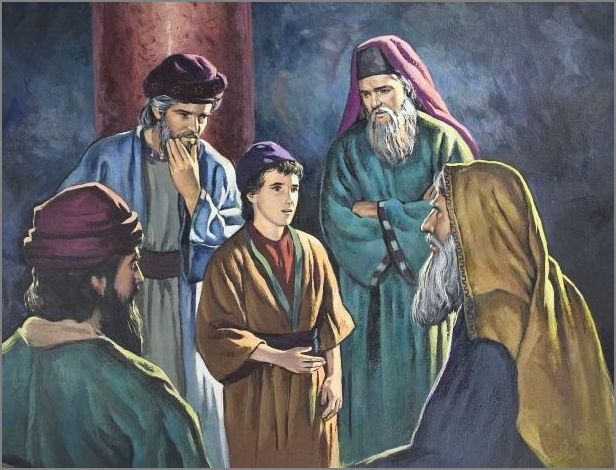 And what horror must have come over Mary and Joseph once they realized that Jesus was not with them. I know this, because although I am not a parent who has lost a child, I am a pastor who once lost a junior high boy at King’s Dominion . . . what was worse is that he’d just arrived in the US from Liberia and spoke little English . . . (I know not one of my shinning moments!)
And what horror must have come over Mary and Joseph once they realized that Jesus was not with them. I know this, because although I am not a parent who has lost a child, I am a pastor who once lost a junior high boy at King’s Dominion . . . what was worse is that he’d just arrived in the US from Liberia and spoke little English . . . (I know not one of my shinning moments!)
But in Mary and Joseph’s case I can imagine they shouted-- “JESUS!” as they re-traced their steps toward the place they last saw him. “Where in the world are you??” though scripture leaves out any emotions like these.
Eventually they do locate him and the conversation begins in what a former professor of mine, Peter Story calls the “censored” version.
They find the boy among the teachers in the temple and Mary says to him, “Son, why have you treated us like this? Your father and I have been anxiously searching for you.”
And Jesus answers, I can imagine with a look of complete innocence on his face, “Why were you searching for me . . . Didn’t you know that I had to be in my Father’s House?”
And the answer is they don’t.
For scripture tells us that “they did not understand what he was saying to them.”
The boy Jesus tries to speak truth to his beloved caregivers and they just don’t get it.
But after this exchange we learn that Jesus goes with Mary and Joseph back home and was obedient to them from this point on.
So enter drama into the narrative right here.
Professor Peter Storey helps us out again here: “If we struggle with Jesus’ being ‘fully human and fully God,’ it should not be surprising if the Jesus child wrestled with his identity too.”
Can you imagine how frustrating it must have been for Jesus? Can you imagine how much tension he felt in his little body? Can you imagine how hard it was for Jesus to play the part (or not) that his parents expected him to play as THEIR first-born and also be THE son of God?
The struggle looked like obedience to parents boy Jesus knew he was smarter than, wiser than and the Creator of, in fact!
The struggle looked like Jesus’ momma hugging him tight thinking she knew what was going on but being completely clueless.
The struggle looked like Jesus going home, humbly submitting to authority and growing “in wisdom and stature, and in favor with God and humankind.”
The struggle of human and divine- it was boy Jesus’ path to walk.
I don’t know if you are like me but I want to file a complaint with Luke right here. I don’t mean to be greedy but I want more. I want more of Jesus. Tell me Luke what Jesus liked to eat, how he liked to play, what it was like when he got into fights with his brothers (or did he?), did Jesus like his chores or did he prefer to spend more time studying after school?
Yet we get nothing else besides these 11 verses until he was 30 years old which starts chapter 3.
So, it begs me to ask these question as the reading is over.
I’m sure there’s more to uncover as you and I keep studying texts like this, but for now this is what I know: as you and I follow Jesus we too, my friends will know the struggle.
The struggle of being told we’re “lost” when we’re really exactly where we need to be!
The struggle of rejection from those who say they love us the most.
The struggle of our mommas wanting something for our life and God saying, “No, I have something bigger.”
The struggle of balancing mundane tasks vs. eternal destinies.
We too will face such pain. We too will be separated from our beloveds. We too will feel so alone.
But we have hope! We have hope like boy Jesus had hope that day as he traveled back to Nazareth, to live his life with all that knowledge in his heart gained from the temple. God was with Jesus. And, God is with us too. We are never told that we must face our struggles alone.
And even better, God gives us the tools we need to face our struggles, our tensions between the tasks of earth and heaven and we learn as we go.
“It's funny: I always imagined when I was a kid that adults had some kind of inner toolbox full of shiny tools: the saw of discernment, the hammer of wisdom, the sandpaper of patience. But then when I grew up I found that life handed you these rusty bent old tools - friendships, prayer, conscience, honesty - and said 'do the best you can with these, they will have to do'. And mostly, against all odds, they do.”
My friends, if boy Jesus taught us anything this we know: we have all of the tools we need to keep going.
We have the tools we need to discern wisdom from folly. We have the tools we need to both submit and rebel. We have the tools we need to connect with our heavenly Parent!
So in this life on earth in community with God and our human brothers and sisters, we keep going. Bit by bit. Step by step. Year by year. Believing that we too will grow in wisdom and favor with God too.
If you want to listen to the full sermon, click here for an audio file.
Jambo (hello) from Kenya.
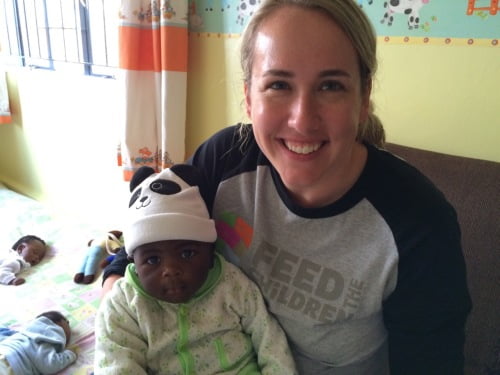 For the past two weeks, I've found myself traveling in East Africa to participate in the work of Feed the Children.
For the past two weeks, I've found myself traveling in East Africa to participate in the work of Feed the Children.
I've taken early morning flights. I've brushed my teeth with bottled water. I've visited primary schools. I've watched the sun set over the Indian Ocean. I've taken lots of pictures for FEED's social media. I've helped to cook Thanksgiving dinner for 50 kids. I've sorted Christmas presents. I've eaten more chips (french fries) than I should. I've held babies, lots of them.
In all of these things, I'm learning.
I'm learning about the importance of traveling with lots of vitamin C, good shoes and your own plane blanket.
I'm learning about having throw-up cloths near by at all times when holding babies, and never to underestimate the power of showing a child a picture of his or her face (what joy!).
I'm learning that slowing down is the way of life in Tanzania and good tea is everything you dream it to be and more in Kenya.
It's my 6th trip to the region since 1999. My East African country list includes Kenya, Malawi, Tanzania, Uganda and Rwanda as well as having flown through Ethiopia on multiple occasions. This region feels more and more part of my life every time I visit. In fact, the Feed the Children staff now greet me when I arrive, "Welcome home!"
I'm learning that when an African says, karibu (welcome) they really do mean it and want you to feel a part of their lives and space. 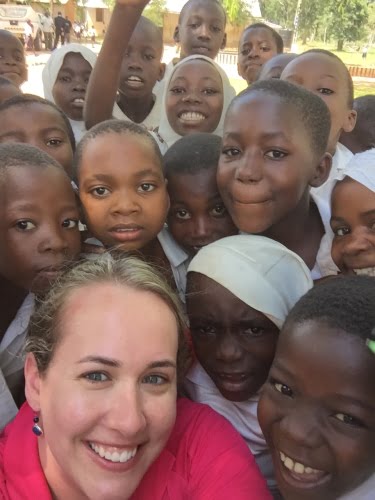
I'm learning the sweetness of friendship is so very possible here, even if there were so many reasons to be disconnected.
But even more than this, this preacher on the plaza is learning about my faith, the faith that I want to have in Jesus.
Coming to Africa reminds me that the Jesus I think I know isn't wrapped up in my American citizenship. Jesus always crosses racial and language divides. Jesus always leads us to the stories of the most vulnerable and ignored. And then asks us do something about what we hear!
Most of all I am learning to not be surprised when Africa opens my heart, like no other place on earth can.
To new friends.
To eyes that tell stories.
To shocking possibilities.
To hope.
One of my favorite authors, Anne Lamott says this: “Hope begins in the dark, the stubborn hope that if you just show up and try to do the right thing, the dawn will come. You wait and watch and work: you don't give up.”
There's so much I'm hoping for here.
For more children to be well-fed.
For nations and their leaders to be at peace.
For my own heart to live into what has eternal value.
Africa: what a classroom!
I'm so glad I'm here.
I write a lot these days.
I write here at Preacher on the Plaza. I write sermons (that I always don't publish) for churches where I'm preaching. I write for the Feed the Children blog called BEYOND where we tell the stories of the good work of this humanitarian organization. And, I am a contracted ghost writer for several folks-- helping them craft their ideas into pieces to be shared with a large audience.
So how do you do it? I am by no means an expert but this is what I've come to claim about the writing life:
1. You must write a lot.
Write with a journal. Write with a computer. Write with scraps of paper. Write when you don't feel like it. Write when you do.
As much as any of us might have a natural inclination for words and beautiful sentence structure, we all still have to learn the craft. We all still have to write shitty rough drafts as Anne Lamott would say. There's no short cuts to your 10,000 hours of practice as my tutors at the Collegeville institute taught me.
2. Write during your most creative time of day.
For me this is annoyingly the moment I put my head on my pillow at night. I lay there and my head floods with topics for new blogs or ideas for how I want to arrange the chapters of book project or an opinion column for a religious blog. I try to fight it, telling myself to forget until morning. But, usually such a declaration doesn't work. So, I say, if creativity calls, run with it. Get up out of bed and do it. (Just don't publish a blog after 11 pm. Most I know are usually sorry for this in the am).
3. Write with heart.
Readers will forgive a multitude of grammar sins if they see the person behind the copy. Especially in persuasive writing (which is what I mostly do), I believe readers want to know you personally care about what you describe. There's nothing worse to read, I think, than a journalistic type writer trying to give you the facts and then expecting you to care when you have no idea if the writer cares first! Caring of course don't have to explicit. People know if you do or don't implicitly.
4. Make friends with other writers.
Other writers speak your language so listen. Non-writers just don't see prose they way a writer does. My mom or my husband, for example, will read my stuff and will often comments in helpful ways, but their feedback is never as a good as that of my writing friends. Fellow writers will say I had "a nice turn of phrase" or "this theme connection really made the essay work" or "I didn't start liking you as a character until half way through the chapter." Also make friends with writers of other genres than your own. This is one of the reasons why I've enjoyed being a part of the Feed the Children copywriting team so much Maybe my sentences don't need to be so complex after all . . .
5. Do not be afraid of the delete button.
When I began writing sermons every week, I felt anxious about cutting large chunks of the piece out. It is so easy to be in love with your own words. It was so sad to see a paragraph go that I would cut and paste it into another word document hoping to come back to it later. The funny thing is that I NEVER would need it. Sometimes the delete button can be your writing project's very best friend. Tear the band-aid quickly though and you'll .
And, most of all read about writing. Bird by Bird by Anne Lamott is one of my favorites.
(Maybe some of these ideas are not only good for writing but any art form?)
 It's been over one year now since I left traditional ministry. And folks say to me all the time, "When are you going back to the church?"
It's been over one year now since I left traditional ministry. And folks say to me all the time, "When are you going back to the church?"
I don't know how to answer other than to say that we need to think about the church in new ways.
Why do we always think about church in terms of buildings and ministers with retirement plans and pensions? Why do we always think of church in terms of who is the staff listed on the back of the Sunday morning bulletin?
And no I don't think I am not going back anytime soon to what you mean by church.
These are the facts: a year ago, I left a weekly pulpit, weekly pastoral care responsibilities and ties to one place, but what I gained in this transition myself.
I said it. I gained myself. I still can't believe that I had the courage to make this leap into the unknown last year. I did have a retirement plan with a denominational board. As much as I've always had a rebellious streak, I've always liked following the rules too.
Yet, I know this past year has been a turning point for me. I think 10 or 20 years from now I'll look back on that year when I was 33 as a time when everything changed. Even with the mid-year moaning and groaning and "what am I doing with my life?" depression I went through (for y'all who lived with me through all of this, thank you!), this move into the unknown was and is a great decision.
The longer I live in this new reality, the longer I know I am not alone and there's other ministers out there like me who want to make such a transition too. I'm gaining a new community.
I recently read Anne Lamott's new book, Stitches. And as I read, I was struck by Lamott's narration of how she quit what she called "her last real job" at the age of 21. She said when she stopped working as a writer at a magazine and called it "the moment when I lost my prestige on the fast track."
When I left the church a year ago, this happened to me too, I think. There were even emails that said: "What are you doing? Why don't you settle down and get a new church in Oklahoma?" (As an aside, I have yet been invited to preach anywhere yet in Oklahoma City-- so even if I wanted a new job in the town where my husband resides mostly, there aren't a lot of opportunities). But who really needs a fast track? I'm still wondering.
Lamott goes on to say about her transition to a non-traditional writing life: "I started to get found, to discover who I had been born to be, instead of the impossibly small package, all tied up tightly in myself that I had agreed to be."
Spot on for me too! These days I am learning and re-learning and then learning some more about the minister, the writer and the human being that I am and was created to be. It's wonderful freedom. I now get to dream without some box of what I think other people want me to be holding me back.
And so in all of this settling down to a new kind of life, I knew my blog-- a medium for so much of this kind of heart-felt communication and exchange needed a makeover. So here it is, and here's my stance. I'm not going back. I am a preacher on a plaza.
As a preacher on the plaza, my new website can give you a tour about the ways in which I'd love to connect with you, your church or non-profit.
I think the conversations we've had and will continue to have are a part of creating what doesn't exist for other ministers, writers, dreamers, poets and businesswomen. This is it. We're on the edge of something beautiful. I just know it.
This week I've been reading Anne Lamott's latest: Help, Thanks, Wow. It's a book about three essential prayers that Lamott says are necessary for all of us to go back to over and over again. Saying to God, "Help!" "Thanks!" and "Wow!"
The first two sections were typical Anne Lamott good-- honest, raw, and real. So real that her words make you want to figure out how to write like this in your own voice.
But the third section has captured my attention in way that I think we don't talk about enough as people of faith: Wow!
Lamott writes: "The third great prayer, Wow, is often offered with a gasp, a sharp intake of breath, when we can't think of another way to capture the sight of shocking beauty or destruction, of a sudden unbidden insight or an unexpected flash of grace."
And when you put it like this, I don't think we don't know how to say wow. Sure, it's a simple enough word, but I can't think of the last time I heard it in a conversation.
Maybe it is because we don't know how to stop.
Maybe it is because speechlessness as a prayer doesn't seem to equate to "real" prayer in our minds.
Maybe it is because we are people who like to rush on through to the next project, the next meal, the next adventure that we keep our eyes shut to "Wow" most of the time.
This week as I've been traveling with the team from Feed The Children in Guatemala, there have been a lot of wow moments.
The children getting a book for the first time.
The smiles of the mothers.
The lake.
The sunshine.
The birds (and flying beatles) waking us up in the morning at sunrise.
As we've been thrust out of our normal day-to-day routines saturated in the beauty of a country with lush hills and valleys, colorful clothes and flavorful foods, it is much easier to say wow. Especially as we've served meals to children with the sparkle of gratitude in their eyes for a simple plate full of tamales, rice and beans, you just can't help but smile in wow!
But I don't think you have to go out of the country or into a new experience to have a "wow" moment or to offer up a "wow" prayer. Such opportunities are all around us, I believe.
Our children learning to say please.
Waking up before our alarm goes off.
An unexpected invitation to dinner.
A card of thanksgiving.
What about you? what is making you say "Wow" where you are today? Here's some photos of mine.
 On my ongoing relationship with the part of myself I call "a writer" I think about a lot about things like this:
On my ongoing relationship with the part of myself I call "a writer" I think about a lot about things like this:
--What is good dialogue and how to construct it authentically
--What are strong verbs and how avoiding adverbs as much as possible.
--What does life smell like and how to describe such without using worn out similes.
But, most of all I think a lot about what makes writing good?
Like most writers, I have that fear in the back of my head that says, "What if I am not good enough at this?" As much as I love the challenge of constructing beauty, what if I am never accepted as a writer. What if I never get published? (Because of course, as much as many of us say that publishing doesn't matter, it does).
And I know I'm not alone.
Because the more I have conversations with folks who are considering writing for the first time or more frequently the one concern that seems to be raised every time is: "What if I'm not good enough? What if no one cares about what I have to say?"
And, what I most want to say to this excuse in myself and others is: "Stop listening to that crap in your head and just write! If you want to write, write!"
I want to say this because I believe we as artists (musicians, painters, dancers, etc. alike) waste so much time that we could spend producing our craft by judging ourselves before we even get out of the gate. And by doing that, we miss out on the best contributions we might have to offer. Anne Lammott, of course has a lot to say about this.
Because what I think makes writing (and of course, this is my humble opinion) good is: writing that tells us the truth. And it doesn't take special skills to tell the truth. You just speak it!
Sure, in the writing world, grammar and proper use of metaphors and paragraph structure within a chapter are all important-- and without the best possible setting for words to flow they simply won't have the chance to leap in reader's hearts as they did in the writer's-- but "good writing" is not all about technical details.
It's about the soul of the piece. Is the writer telling their truth?
I read a lot. And I can usually tell pretty quickly if I am going to stick with a book or discard it from the pile of books on my nightstand or in my Kindle.
I am easily annoyed by writers who try to sound like someone else or use words that aren't a part of everyday language of anyone I've ever met or who are so full of ego they don't admit what is really troubling them.
I love stories: stories that make me feel less alone, wise stories that speak truth on the page that I'm not ready to say aloud, but want to, stories that give me new insight into those I love and those I hate, and stories that leave me convicted about how much more I need to learn on this journey of life we're all on.
Writing like this take courage.
It takes time to know yourself well enough to bring truth to the page.
It takes hope in the human condition-- that when you risk the potential disappointment of putting yourself out there-- others hungry for the truth will hold your work with the reverence it deserves.
So, what makes writing good? For today, I say, it is YOU who makes YOUR writing good. And ME, MINE-- even the parts of me that are anxious, fearful, scared, unforgiving or absent-minded. When I do the work of bringing more of ME to my work, then I think not only do you call it "good" but my Creator looks at my creation and smiles.
 Writing is a ministry. It's ministry as much as as preaching or pastoral care or any other of the serving tasks.
Writing is a ministry. It's ministry as much as as preaching or pastoral care or any other of the serving tasks.
While in the parish I would often spend afternoons working on articles for publication or blogging. Sometimes I'd feel guilty as I typed away.
Maybe I should have been visiting one more person?
Maybe I should have been a better administrator by filing away paperwork sooner?
Maybe I should have started sermon research earlier in the week? Or maybe not. As my friend, Beth would say, I was "shoulding" all over myself.
Yet, there was always something in me that said writing was important.
So, now and in the immediate future I am claiming the time that I spend writing as my primary ministry. I'm done with the guilt. I'm just going to do it.
And, I'm falling in love as I learn things like:
1. You can't be afraid, as Anne Lamott would say to write a shitty first draft.
I would covet to be the kind of writer who can pour out her soul in perfectly constructed paragraphs and completely interested sentences the first time. But, I just can't. I can't tell you how many boring, throw away sentences I construct on any given day. Writing is always as much about a process than it is about the destination.
2. The more you write, the more it clicks and clicks faster.
It has been amazing to me to start reading like a writer. For example, now, if someone asks me to read a piece of theirs, I can more easily say things like, "You need to cut out the first two paragraphs. You don't make a point til 3/4 down on the first page." Why? Because when you spend your days editing your own work, you begin to see all collections of words of others in a more precise edge. You know a good piece of prose when you see it (and when you don't) and you're ok if others disagree with you.
3. The more you commit to learn the craft of writing, the more you begin to look at the world like a writer.
A big change in me has happened over the past couple of weeks. I walk into a room and think about how I would describe its smell, its texture, or its sounds. Why? Because as I'm trying to narrate a series of past events in book form right now, I realize that in real-time I never really noticed details of settings. I am a big picture girl who does not like to focus on the blades of grass. But, in the future, I want to know. I want to know what it felt like to walk through a crowded bus. Or what it smelled like stepping off an airplane. Or what the countertop of my best friend's mom's kitchen feels like. If I am going to keep writing, then I need to pay closer attention to the blades.
4. The delete button is your best friend.
I don't know about others of you, but I can so easily become attached to sentences. I love them like they are birthed children or the finnest meals ever cooked on silver platters. In love, ignore the run-ons, out-of-place fragments or passive tense verbs. And, because I love them, I never want them to go. But, this can't be! Though painful at first, the crispness of my narrative seems to thank me later (and so does my writing group when they read my drafts!).
5. You can love through words.
Words to me are tools of art. Just as a painter needs brushes or a sculptor needs clay to create what stirs the hearts of any who behold their creation, I need words. I need words to say thank you. I need words to show kindness. I need words to give hope. And in making art-- stories, essays or even sometimes poems, I love. I love myself by creating the space of a sentence to say what is most real. I love those whom I know by paying attention to details which can be later shared back with them. I love those I do not yet know by selecting universal words so my words can be an offering of our common experience.
Other writers what are you learning?
Advent 2
Luke 1:39-56
Around mid-December, it’s so easy to want to rush on through, say Christmas is here, and let’s pack up the decorations, open up the gifts, eat another turkey and move on. I know for several of you who attended and participated in the choir concert yesterday—feel as though the joy of that event has made it seem like Christmas has already come and passed. Wasn't it just a wonderful afternoon?
But thank goodness scripture, as we read it together every week in worship, wants to slow us down. Thank goodness scripture wants us to savor every moment of this season. Thank goodness scripture helps us see clearly that the journey of Christmas was not just about the destination birth, but about the journey to get there. And, we’ve got several more weeks left to wait and see what we uncover as we’re intentional about our waiting.
As we continue our Advent series this morning on waiting for Christmas—today, waiting with Jesus’ mother, Mary—it is important to remember what a radical perspective we have before us.
Luke’s gospel, where our lection for today comes from, is the only book of the Bible to narrate from the perspective of or to include women as main characters. For example, Mark’s gospel doesn’t mention Mary and skips the birth story of Jesus altogether. Matthew’s gospel assigns Mary the obvious role of birthing Jesus, but gives her no speaking parts. The apostle Paul speaks only of Jesus being “born of a woman,” never giving this woman a name. Yet, thank goodness for Luke or we’d never know much about this Mary, the beloved center of our Christmas readings.
But, what was going on?
 Previously, Mary had just gotten some life changing news. Not only was she pregnant, but she was pregnant with, wait for it, the son of God. No small news at all. Yet, even as the angel Gabriel has foretold the great news to Mary about the coming of Christ, she still had to wait. Pregnancy, as we know, is a nine month sentence to waiting.
Previously, Mary had just gotten some life changing news. Not only was she pregnant, but she was pregnant with, wait for it, the son of God. No small news at all. Yet, even as the angel Gabriel has foretold the great news to Mary about the coming of Christ, she still had to wait. Pregnancy, as we know, is a nine month sentence to waiting.
And, from this narration, we get to ask the question: “What did Mary do as she waited?” Obviously, her body began to change, morning sickness found her, new aches and pains found their way to her back and ankles. Her belly grew. Beyond this, what did she do? How did she cope with the joy, the fear and the anticipation of this life altering news?
Well, verse 39 of Luke 1, takes us right in the middle of the action. Mary would not sit at home and be idle in her waiting. Nor would she move into her betrothed husband’s home, Joseph and cry about all the humiliation that might come to her as a new unmarried mother. She would not stay in the past trying to savor every last-minute of her childhood with her parents. Instead, scripture tells us that she “set out and went with hast to a Judean town in the hill country, where she entered the house of Zechariah and greeted Elizabeth.” Elizabeth was Mary’s cousin, though many years older.
If we study our Biblical geography, we know that from Mary’s home in Galilee to Judea, it was at least 70 miles of a trip—and most likely longer if she avoided the direct route through Samaria, as most Jews undoubtedly did due to political tensions. A long tedious, and potentially dangerous trip was this, taking several days. We are given no indication that Mary traveled with others (though the protective side of me as a reader really hoped that she did!).
Above all, Mary risked the familiar of home to wait in pursuit of the fulfillment of God’s plans for her. Her bravery and courage to go be with a family member she thought might be supportive shows us what it is like to actively wait. Sometimes we’ve got to simply move from point A to point B. And Mary’s long trip was worth it, Elizabeth and Zechariah proved to be perfect waiting partners.
How so? Because it had already happened to them! Zechariah and Elizabeth had also been told they’d have a son too, who would help prepare the way for the one who was now growing in Mary’s belly.
And like Mary, Zachariah and Elizabeth knew what it might be like to trust God with all their might. They knew what it was like to have their friends call them wacko. They knew what it felt to know the God of Israel personally as the word of the Lord had come to them too.
In the arms of her cousins, Mary found two dear ones who truly understood who she might be feeling.
In the same way, when we find ourselves in situations requiring our patience and most of all waiting—who we wait with is very important. The voices echoing our life has a lot to do with how we stick to the paths that God has laid out for us.
When we want to go to college again to study for a vocation that we think might serve others and our parents think that is stupid—we might find ourselves dropping out before we’re done.
When we hear about a well-paying job that seems like a great opportunity but our gut says, “That’s company is trouble” and all our close associates say, “Go for it” we might just find ourselves accepting trouble we could have avoided.
When faced with how to go about cancer treatment and we want to add in holistic practices of herbs and meditation, but our spouse things it’s a complete waste of time, we might find ourselves rushing through traditional treatment at a furious pace, not as we’d desired.
Human beings are swayed of course, oh so easily, aren’t we by who or what we are around? Just bake chocolate chip cookies or flash the “Hot Donuts Now” sign in front of someone who recently proclaimed they’re not eating sweets anymore, and see how long their will-power lasts.
So, this is what we need to know: Mary did her part to actively wait—to make sure she was around people who understood who could be mentors in the journey to motherhood.
But not only did Mary do her part, but she allowed grace to do its part as well--
And one of those gifts of grace was just the presence of Elizabeth herself. For not only did Elizabeth, now six month pregnant with the one who would be called John, accept Mary, just as she was, but she helped Mary speak truth rightly about her life.
Look with me at verse 44. Elizabeth speaks to Mary, “For as soon as I heard the sound of your greeting, the child in my womb leapt for joy. And blessed is she who believed that there would be a fulfillment of what was spoken to her by the Lord.”
Elizabeth is basically saying to Mary: “I know who you are. I know who your son is, my son in my womb knows too! This is something that needs to be celebrated. It just can’t wait! We’ve got to do it now”
Elizabeth helps Mary know what she knows, giving her courage to wait with confidence of all that was to come. Mary received grace through Elizabeth, I believe, enabling her to speak so confidently of what God had done for her and thus Israel too. Elizabeth’s truth telling, I believe propels Mary into speaking the beautiful Magnificat, one of the most beloved prayers of adoration in all of scripture as was just read a few moments ago.
But not only did grace come in the gift of Elizabeth, a friend for the journey, but it came simply as God worked things out, as God can only do.
You see, in the first place, there was no real reason for Mary to be waiting on God in such a special way at all.
 Maybe, when you think of Mary—the way our culture has exalted her, hallowed images of a beautiful skinned woman with long flowing brown hair adorned with a perfectly arranged blue headdress like in the picture come to mind. Or, maybe just the world “blessed?” For all you former Catholics in the room— “Blessed are thou among women and blessed is the fruit of your womb, Jesus. . . .”
Maybe, when you think of Mary—the way our culture has exalted her, hallowed images of a beautiful skinned woman with long flowing brown hair adorned with a perfectly arranged blue headdress like in the picture come to mind. Or, maybe just the world “blessed?” For all you former Catholics in the room— “Blessed are thou among women and blessed is the fruit of your womb, Jesus. . . .”
But in these remembrances we forget the unusual aspects of Mary’s story.
Mary was the most unlikely of characters to be favored by God. History suggests to us that Mary was not a grown woman, but a young teenager. Mary was not from any special family. Mary was not someone in a position of power, prestige or even honor. She was a woman in a culture that said she had no voice and only mattered when she brought forth sons that brought the family money or power.
But, yet, God was doing a work in her life that was exalting her with this great role to play. She had quite a testimony!
Mary says, “My soul magnifies the Lord, and my spirit rejoices in God my Savior for he has looked with favor on the lowliness of his servant. . . . for the Mighty one has done great things for me.”
God blesses Mary. God calls her out. All I can call this is grace.
As Mary actively waited, received instruction from those sent to encourage her, God’s grace came in simply knowing that God was with her. God was working something out in her life that only God could do.
I had several conversations this week with folks wondering with me about how it is they move through difficult situations in their life. Many of these folks are waiting on life to get better. They’re waiting on life to make more sense. They’re waiting on the feeling that “this is the most wonderful time of the year” that seems to played every hour on those Christmas stations. Yet, in their waiting, they feel stuck. They feel like God has forgotten them. They’re angry with those who are happy, wishing that they could feel the same. They’re looking for the answer to make things finally alright again.
I feel their pain. I’ve been there too. There’re nothing more difficult to be waiting for what is or is not good news. In fact it doesn’t really matter. When we’re waiting on life situations that we think are not favorable, of course we’re upset. When we’re waiting on the good to come, we psyche ourselves out often, talking ourselves into believing that the good we’re preparing for will not come, or come as we hoped it would. Waiting is hard. Really hard. I’ll say it again. Waiting can really, really stink.
But, if we are going to take our cues from Mother Mary this morning about what how we position our lives to wait with God, we know there is work to do. There’s a part for us to play in the ongoing drama of God’s work in the world—there are journeys to make, phone calls to have, emails to send, friends to invite over for dinner. Knowing that as we do what we can do—grace will meet us to do the rest. People will show up to help, distant cousins, old pals, or faithful companions. And, God will open doors—doors that may have had a big fat “NO!” on them only minutes before. God will give us grace to take the next step—even if we have no idea where we are going as we take that step.
Author Anne Lamott, who you know as one of my favorites says this about this kind of life: "Hope begins in the dark, the stubborn hope that if you just show up and try to do the right thing, the dawn will come. You wait and watch and work: you don't give up."
We may be in the darkness now, but the light of gospel is coming. There’s a reason, you know that we light so many candles in worship this time of year. Hope is on its way. Wherever state you find your life in today, let us cling to hope of each other and God’s strange plans as we wait together.
AMEN
 1. Best piece of advice I ever got about becoming an adult was- "Make good friends and keep them."
1. Best piece of advice I ever got about becoming an adult was- "Make good friends and keep them."
I ran across this quote last week from Anne Lamott and posted it on Facebook. Seems to be appropriate to share here too: “It's funny: I always imagined when I was a kid that adults had some kind of inner toolbox full of shiny tools: the saw of discernment, the hammer of wisdom, the sandpaper of patience. But then when I grew up I found that life handed you these rusty bent old tools - friendships, prayer, conscience, honesty - and said 'do the best you can with these, they will have to do'. And mostly, against all odds, they do.”
2. In the same way, I recently heard Oprah say recently something to this effect "Some people don't have the oxygen to make up life's mountains with you." Some friends are just for a season. They don't have the oxygen to climb with you, and to make them feel bad about this is not fair to either of you. Keep climbing beside those who do. You might have to make new friends. You might need to rediscover friends from long ago, but it is all good. The climbing partners are there. Keep your eyes open.
3. There's always time for relationship surprises. Henri Nouwen wrote of a now-famous conversation which helped him think about this concept: “While visiting the University of Notre Dame, where I had been a teacher for a few years, I met an older experienced professor who had spent most of his life there. And while we strolled over the beautiful campus, he said with a certain melancholy in his voice, "You know . . . my whole life I have been complaining that my work was constantly interrupted, until I discovered that my interruptions were my work." Maybe that phone call or email or visit that you didn't expect today could be in fact your greatest gift to give the world today . . . something for all of us to think about.
4. Friends can be the family we most need. I give thanks this week for one of my dearest friends, Kristina whom spent a lot of time this week visiting DC with her husband and daughter. Somethings never change like the fact that folks either think we're related or they mistake us for one another from a distance. It was fun to be called, "Kristina" this week again when a church member couldn't tell us a part. And to finish each other's sentences!
5. To love someone, though is not to cling to them. Can I say how much I have loved the book, Awareness by Anthony de Mello. It's a text that I know is not new to the world (was published in 1990) but it has been the gift that has kept on giving to my life in the past month. Every morning de Mello and I have a date and it's wonderful! And he writes this: “Perfect love casts out fear. Where there is love there are no demands, no expectations, no dependency. I do not demand that you make me happy; my happiness does not lie in you. If you were to leave me, I will not feel sorry for myself; I enjoy your company immensely, but I do not cling.”
6. To love someone, is also to hold them close in committment. One of my favorite quotes about this, I blogged about this over a year ago, here.
7. "You can only be as close to the heart of God as you allow your heart to be to others." A spiritual director imparted this wisdom to me years ago. It was a season of my life when I was wrestling with how much time I spent studying for school and how much time I allowed my daily patterns to be spent with a group of people I was growing very close to. Her words encouraged me that friendship is as much of a spiritual discipline as is prayer, quiet, service, etc.
8. Can pastors be friends with parishioners? Such is a question that is frequent discussed in my clergy circles. Most of my colleagues seem to have a different opinion about it usually based on their personality, family situation and church size. I've come to believe that while maintaining healthy boundaries is appropriate, it's a decision that everyone has to make for themselves. Sometimes it works and sometimes it doesn't.
9. Friends are those who walk beside us and love giving the good gift of silence. Sometimes there are no words for the grossness of life that we are asked to walk through with each other.
And because one can't get enough of Henri Nouwen on this topic, here's another quote of his that I adore: "“When we honestly ask ourselves which person in our lives mean the most to us, we often find that it is those who, instead of giving advice, solutions, or cures, have chosen rather to share our pain and touch our wounds with a warm and tender hand. The friend who can be silent with us in a moment of despair or confusion, who can stay with us in an hour of grief and bereavement, who can tolerate not knowing, not curing, not healing and face with us the reality of our powerlessness, that is a friend who cares.” from The Road to Daybreak: A Spiritual Journey
10. True friends are those whom you tell the same story to at least 10 times knowing that when you need to tell the same story over for the 11th re-telling they'll be around to hear it then too. Who says stories only need to be heard once? Thank goodness there are those who can hear us into understanding!
Here's to hoping your life is filled with some moments to share today with those whom you call friends!
Yesterday I preached on I Samuel 15:34-16:13, and though I thought I would be writing a sermon about God's unlikely choices this ended up being a sermon about grief. Surprised me for sure! I just couldn't seem to get the "How long will you grief for Saul?" verse out of my mind as I prepared. So, I just went with it and here's a portion of it:
 When is the last time you truly grieved over something? I mean a good long cry, a into the night cry, into the next day cry that you thought that you never would get over?
When is the last time you truly grieved over something? I mean a good long cry, a into the night cry, into the next day cry that you thought that you never would get over?
I remember the spring when my grandmother died. Gran, who had played a central role in my upbringing and joy in my childhood, died as when I was in my second semester of seminary. Gran was more than just a grandmother via biological connections, she was a friend, a confidant, someone in whom I talked my problems over with regularly. She made me feel special always in a way that others did not. When she died, the loss stung deep. It ached. It made me feel like there was no reason in the morning to get out of bed-- though trust me, there was plenty of papers calling my name to write! But, I couldn't seem to get over it as much as I tried.
Anne Lamott in her book Operating Instructions writes about the first year of her son's life the experience of getting used to motherhood but at the same time grieving the death of one of her closest friends saying, "And I felt like my heart had been so thoroughly and irreparably broken that there could be no real joy again, that at best there might eventually be a little contentment. Everyone wanted me to get help and rejoin life, pick up the pieces and move on, and I tried to, I wanted to, but I just had to lie in the mud with my arms wrapped around myself, eyes closed, grieving, until I didn’t have to anymore.”
Sometimes as much as we want to get over the loss of someone or something, we simply can't. Our grief grips us and becoming the central story of our lives to the pint in which we simply can't even comprehend seeing past our own circumstances.
Grief, as many of you know, especially those of you who have studied it in workshops and other seminars, is not always about loss via death. Grief over the loss of careers, aspirations or relationship which used to be close but are no longer can paralyze us as deeply as any physical death can. To wake up one morning and find that what you thought was your life work is destroyed by the rejection of others, to come to terms with your best friend no longer is speaking to you, or be let in on a truth about our family after years of secrecy, we can feel smacked in the face. Grief seeks to holding us down for as long as possible. Grief, if we don't find a way to move through it can destroy our lives.
In our Old Testament lesson for this morning, we meet the prophet Samuel again.
Called out as the great prophet of Israel, called out as young boy to be the saving grace leader of a nation in deep decline, called out as the one who would be God's spokesperson to a people desperate to hear a good word-- Samuel was on top of the world. Things were going great! Samuel was the hope of the nation, after all. Yet, in this state of extreme responsibility, I can imagine that Samuel felt he needed to make just the right choices at just the right time so to ensure that the nation of Israel had a future. And for a while, it seemed Samuel tasted the sweet fruit of his good, seemingly God led choices.
So, what happens when all goes badly? What happens when the king HE anoints behaves badly and needs to be removed from office?
And it is at this juncture, we find him in a place of deep grief. All is not well in his world. Samuel blames himself. He pouts. He cries. And, see Saul's failures as a reflection of himself. How can he ever again show his face in public after Saul has flopped big time? Grief was his primary story.
And God has a word with him about it saying in 16:1: "How long will you grief over Saul?"
Or, "How long, Samuel will grief be your story?"
It is not that grieving is wrong or an inappropriate emotion, but that for every period of grief, (especially the more pity party kinds)-- there comes a time when it must end. For as spiritually cleansing and healthy as grief is, it's an emotion has a time and season. For, if one stays in a grieving process too long, past its time-- it can actually be destructive. For Samuel, God says, it is time to move on.
Grief over what could, should, would have been and all the feelings of personal failure internalized held Samuel captive, we learn. In particular for Samuel, his grief held him captive to only what he could see, hear, and feel in the present moment. Grief stole his vision for life and the people he was entrusted to lead.
Thus, the Lord is saying to him, "You are not perfect. All is not perfect in this land. I know this. But one thing still holds true: I still love these people. I still love you. And, there is work to be done in the future!" And this is the post-grief task one that our text narrates for us, God says: "I have rejected [Saul] from being king over Israel. Fill your horn with oil and set out; I will send you to Jesse the Bethlehemite, for I have provided for myself a king among his sons."
Though Saul has been a disappointment of a king and leader and Samuel wants to keep believing that it was all his fault, such feelings just aren't helpful. In fact, God is asking him to dust his sandals off from the dirt in which he's sat and go be a part of the next great thing that God was going to do in the nation: anoint the next king.
And, it's important to note here that it would have been easy for Samuel, as he went to find the next leader, to fall into the trap that is naturally a part of being in an aggrieved state: the syndrome of "must do anything to fix the pain right now."
You've met these people if you aren't one right now: the "hurry up and get this over with" folks. Pain and its effects are despised so much that these people will do anything not to feel the pain of disappointment, rejection or loss. Things like: drinking too much wine when they get home from work, staying at the gym too long and skipping meals, or even drowning each night away in mindless tv-- just avoiding the grief through a distraction.
Or, the approach of getting to work too rapidly, taking the lead alone to solve the grief right away. Type A things like signing up for every single class or seminar known to man about a particular issue-- trying to become the expert of one's own problems. Things like making lists after lists after lists of what can be done-- trying to logically organize their way through your problems. Or even, the simple act of refusing to rest through grief-- doing, doing and more doing.
In all of this, I believe that God knew that Samuel could be in this exact place as well-- trying to avoid or solve the problem too quickly. Samuel is given exactly, then what grief needs to keep moving-- clarity. Samuel is told exactly what to do, exactly what to say, and exactly who to listen to when he arrives at the hometown of Jesse. The end of verse three gives us what is most important as a word from the LORD: "You shall anoint for me the one whom I name to you."
Specifically Samuel was told in verse 7 not to make a quick judgment just to get the process of selecting the next leader done as quickly as possible. Sa ying, to Samuel, "Do not look on his appearance or on the height of his stature, because I have rejected him; for the Lord does not see as mortals see; they look on the outward appearance but the LORD looks on the heart."
ying, to Samuel, "Do not look on his appearance or on the height of his stature, because I have rejected him; for the Lord does not see as mortals see; they look on the outward appearance but the LORD looks on the heart."
God saying, "Don't just go Samuel to who you think meets the criteria that others will approve of. Instead, listen to me. I can show you who has the heart for the work of king. Don't make this process about you. Listen."
Or simply stated, Samuel could have rushed through the line of brothers among Jesse's sons-- very easily he could have solved his failure complex quickly-- but if he did, then, he'd be missing out on an opportunity to hear God's leading.
And, thus, this is the surprise-- in Samuel's grief, in his pain, God was about to do a new thing, a new thing in the life of Israel where healing would come from the unlikely choice of youngest son David as the next king as Samuel kept listening. This was all he was asked to do.
I can remember some of the most powerful words said over me (that I obviously still remember to this day) at my ordination service. During the laying on of hands a deacon of the ordaining church came up to me and said, "Listen to God. You've gotten to this point in your life through listening and you will do great things if you keep listening."
Isn't God funny like this sometimes? We make it so difficult when all we are asked to do is to put one foot in front of the other and listen as we go. Of course this doesn't take away the pain or the loss, but we do have direction for what is next. And this can be grief's greatest surprise . . .
How else have you been surprised by grief in your life? I'd love to know!
. . . a writer like Anne Lamott
 She recently said this about writing: "I try to write the books I would love to come upon, that are honest, concerned with real lives, human hearts, spiritual transformation, families, secrets, wonder, craziness — and that can make me laugh. When I am reading a book like this, I feel rich and profoundly relieved to be in the presence of someone who will share the truth with me, and throw the lights on a little, and I try to write these kinds of books. Books, for me, are medicine."
She recently said this about writing: "I try to write the books I would love to come upon, that are honest, concerned with real lives, human hearts, spiritual transformation, families, secrets, wonder, craziness — and that can make me laugh. When I am reading a book like this, I feel rich and profoundly relieved to be in the presence of someone who will share the truth with me, and throw the lights on a little, and I try to write these kinds of books. Books, for me, are medicine."
------------------------------------------------------------
Like Lamott these are the kinds of books I like to read, and I've been dreaming one day to write too. I want to use my writing to cut to the heart of the way things really are. I want to encourage readers to have hope. I want to touch the depth of the human experience that somehow connects us all.
For my first full-length project I've got six chapters down and who knows how many to go? And revisions after revisions after revisions to go.
This is what I promise you future readers: each time I sit down to write I will tell the truth the best I can. Such is a scary writing proposition, but I know in the end it is going to be good. The draft after draft nights will be worth it. I just know it!